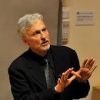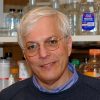Bill Adair is the Knight Professor of the Practice of Journalism & Public Policy and the Director of the DeWitt Wallace Center for Media and Democracy. One of 25 Knight Chairs at universities around the country, Adair’s research and teaching focuses on fact-checking and new forms of journalism. The creator of the Pulitzer Prize-winning website PolitiFact, he has been recognized as a leader in new media and accountability journalism.
Click for more info

People
Associates of Science & Society have been recognized for their ongoing contribution to our mission and goals. Their participation in our education and outreach programs demonstrates their dedication to maximizing the social benefit from scientific progress by making science more accessible, just, and better integrated into society.
Bill Adair
Knight Professor of the Practice of Journalism and Public Policy; Director, DeWitt Wallace Center for Media and Democracy

David J. Adams, PhD
Adjunct Associate Professor
Affiliations: Division of Medical Oncology (DOM)
David Adams’ research in anticancer drug discovery and development led to an interest in policy issues in health and human services, including adequate funding of national research efforts, more efficient and equitable peer review, public and private research partnerships to address declining rates of new drug approvals, and policies to protect human subjects in medical research. Click here or here for more info.

Susan C. Alberts, PhD
Robert F. Durden Professor of Biology
Affiliations: Trinity College of Arts & Sciences, Nicholas School of the Environment, Duke Population Research Institute, DIBS
Susan C. Alberts is an American primatologist, anthropologist, and biologist who is the current Chair of the Department of Anthropology at Duke University; previously, she served as a Bass fellow and the Robert F. Durden Professor of Biology at Duke. Click here for more info.

Dr. Elizabeth Albright
Chair, Environmental Economics & Policy Program
Affiliations: Assistant Professor of the Practice of Environmental Science and Policy Methods, Chair, Environmental Economics & Policy Program, Nicholas School of the Environment
Elizabeth’s current research centers on how policies and decisions are made in response to extreme climatic events. Further, she is interested in collaborative decision-making processes, particularly in the realm of water resource management. She has received a grant from the National Science Foundation and a Fulbright Scholarship to support her scholarship. Prior to completing her Ph.D. Elizabeth worked for the State of North Carolina in water resource management. Watch Dr. Albright’s Coronavirus Conversation. Click here for more info.

Edna Andrews, PhD
Nancy & Jeffrey Marcus Professor; Chair, Linguistics Program
Affiliations: Linguistics & Cultural Anthropology, DIBS
Edna Andrews researches and teaches in the fields of cognitive linguistics, sociolinguistics, and neurolinguistics. Her theoretical research focuses on cognitive neurolinguistics and cross-cultural cognitive linguistics. Recent publications include Neuroscience and Multilingualism, a longitudinal fMRI study of multilingualism, perception studies of spoken and sung phonemes, and cognitive linguistic analysis of cross-cultural categories of emotion. Click for more info.

Dan Ariely, PhD
James B. Duke Professor of Behavioral Economics
Affiliations: Fuqua School of Business, Sanford School of Public Policy, Duke University Energy Initiative
Dan Ariely is the James B. Duke Professor of Psychology and Behavioral Economics at Duke University. He does research in behavioral economics on the irrational ways people behave, described in plain language. Click for more info.

Dean Valerie Ashby
Dean of Trinity College of Arts & Sciences
Affiliations: Trinity College of Arts & Sciences
Valerie Ashby became dean of Trinity College of Arts & Sciences on July 1, 2015, and was recently reappointed for a second, five-year term. She received her B.A. and Ph.D. degrees in chemistry from the University of North Carolina at Chapel Hill and completed her postdoctoral research at the Universitat Mainz, Germany. Dean Ashby came to Duke from UNC, where she chaired the chemistry department from 2012-15 and was a faculty member since 2003. Click here for more info.

Christopher Bail, PhD
Professor of Sociology, Public Policy, and Data Science
Chris Bail is Professor of Sociology, Computer Science, Political Science, and Public Policy at Duke University, where he directs the Society-Centered AI Initiative and co-founded the Polarization Lab. He studies how artificial intelligence shapes human behavior in a range of different settings—and social media platforms in particular. Click here for more info.

Jeffrey P. Baker, MD
Professor of Pediatrics
Jeffrey Baker is a professor of Pediatrics and History, he has practiced for over 25 years as a general pediatrician in Duke Children’s Primary Care with a focus on children with autism and special needs. His historical work has also centered on child health. As the author of the book, The Machine in the Nursery, he is a leading authority on the history of neonatal medicine. Most recently, he has been engaged in a project reconstructing the work of the “discoverer” of autism, Dr. Leo Kanner, through examining original case records from Johns Hopkins University. Click for more info

John Bartlett, MD
Professor; Co-Director, Center for AIDS Research
Affiliations: Duke Global Health Institute
John Bartlett’s research focuses on the treatment and complications of HIV infection. He is also a Senior Fellow with the Duke University Health Inequalities Program, and co-chairs the Duke University Africa Initiative. A major focus of his ongoing work is capacity building at the Kilimanjaro Christian Medical Centre in Moshi, Tanzania. Click for more info.

William Bauer, PhD
Teaching Assistant Professor
Affiliation: NC State University Philosophy & Religious Studies
William Bauer explores metaphysics (theory of reality) and the philosophy of science, especially the nature of dispositional properties and powers. He also has strong interests in bioethics and philosophy of mind and works to apply metaphysics to analyzing problems in bioethics. Click here for more info.

Richard Bedlack, MD, PhD
Professor of Neurology
Affiliations: Duke Department of Neurology, DIBS
Richard Bedlack is an associate professor of medicine/neurology at Duke, director of the Duke ALS Clinic, and chief of neurology at the Durham Veterans Affairs Medical Center. He has won awards for teaching and for patient care, including: best neurology teacher at Duke; Health Care Hero; Strength, Hope, and Caring Award; America’s Best Doctors; the American Academy of Neurology’s Kenneth M. Viste, Jr., MD, Patient Advocate of the Year Award, and the ALS Association’s Rasmussen Award for ALS Patient Advocate of the Year. He has received research grants, participated in clinical trials, and published more than 70 articles. He is also a past chair of the North American ALS Research Group, and leader of the international ALSUntangled program, which utilizes social networking to investigate alternative and off-label treatment options for patients with ALS. Click here for more info.

Lori Bennear, PhD
Associate Professor
Affiliations: Nicholas School of the Environment
Lori Bennear’s research focuses on evaluating environmental polices and improving methods and techniques for conducting these evaluations. Her specific niche is in bringing rigorous quantitative methods to evaluate the effectiveness of environmental policies, evaluating strategic behavioral responses to non-traditional regulatory regimes, assessing the distributional impacts of these new regulatory regimes, and evaluating the role of program evaluation in environmental policy. Click for more info.

Victor Bennett, PhD
Assistant Professor of Business Administration
Affiliations: Fuqua School of Business
Victor Bennett is a member of the Strategy area faculty at Duke‘s Fuqua School of Business. During the 2016-2017 academic year, he served as the Senior Economist for Technology and Competition Policy for the White House Council of Economic Advisers (CEA). His recent research focuses on the trend in the American economy towards fewer, bigger firms that are harder to displace. His work has been published in top journals including Management Science, Strategic Management Journal, Strategy Science, and Organizational Behavior and Human Decision Processes and has been covered in the press including the Wall Street Journal, Marketplace (APM), Quartz, Rolling Stone, and Bloomberg Businessweek. Currently, Dr. Bennett teaches the core course “Fundamentals of Strategy” at Fuqua. Click for more info

Miles Berger, MD, PhD
Assistant Professor of Anesthesiology
Affiliations: Duke Anesthesiology, DIBS
Miles Berger’s research team focuses on understanding the cause of postoperative cognitive dysfunction (POCD) and delirium, and whether these disorders are caused by perioperative changes in Alzheimer’s disease pathways. They are also interested in whether delirium or POCD are associated with an increased long term risk of developing Alzheimer’s disease. Click here for more info.

Emily S. Bernhardt, PhD
Jerry G. and Patricia Crawford Hubbard Professor
Affiliations: Trinity College of Arts & Sciences, Nicholas School of the Environment, Duke University Energy Initiative
Emily S. Bernhardt is an ecosystem ecologist and biogeochemist whose research is principally concerned with tracking the movement of elements through ecological systems. Her research aims to document the extent to which the structure and function of aquatic ecosystems is being altered by land use change (urbanization, agriculture, mining) global change (rising CO2 , rising sea levels) and chemical pollution. Ultimately this information is necessary to determine whether and how ecosystem change can be mitigated or prevented through active ecosystem management. Click here for more info.

Donald H. Beskind, JD, LL.M
Professor of the Practice of Law
Affiliations: Duke Law School
Donald H. Beskind directs and teaches in Duke Law School’s Trial Practice program and teaches Torts and Evidence. He has been a trial lawyer that represented plaintiffs in civil cases and defendants in criminal cases throughout his career. Click here for more info.

Nrupen Bhavsar, PhD
Assistant Professor in Medicine
Affiliations: Duke University School of Medicine
Nrupen Bhavsar is a quantitative scientist with methodological expertise across epidemiology, biostatistics, and bioinformatics with extensive experience in analyzing large, high-dimensional healthcare data, project development, client engagement, and linking together multiple projects to build initiatives. He has applied experience in the use of real world data, including data from the electronic health record, to develop evidence strategy and identify value across multiple clinical areas, including oncology, cardiovascular disease, chronic kidney disease, pulmonology, and musculoskeletal disease. Click here for more info.

Dr. Margarita Bidegain
Professor of Pediatrics
Affiliations: Duke University School of Medicine, Associate of the MA in Bioethics and Science Policy Program
Dr. Margarita Bidegain is a neonatologist in Durham, North Carolina and is affiliated with multiple hospitals in the area, including Duke University Hospital. Click here for more info.

Gerard Blobe, MD, PhD
Professor of Medicine
Affiliations: Duke University School of Medicine, Duke Cancer Institute
Gerard Blobe is a medical oncologist. His laboratory focuses on transforming growth factor-ß (TGF-ß) superfamily signal transduction pathways, and specifically, the role of these pathways in cancer biology. Click here for more info.

Jana Schaich Borg, PhD
Assistant Research Professor in the Social Science Research Institute
Affiliations: Social Science Research Institute, DIBS
Dr. Jana Schaich Borg uses neuroscience, computational modeling, and emerging technologies to study how we make social decisions that influence, or that are influenced by, other people. Click here for more info.

Mark Borsuk, PhD
James L. and Elizabeth M. Vincent Professor of Civil and Environmental Engineering
Affiliation: Pratt School of Engineering
Mark Borsuk’s research concerns the development and application of mathematical models for integrating scientific information on natural, technical, and social systems. He is a widely-cited expert in Bayesian network modeling with regular application to environmental and human health regulation and decision making. He is also the originator of novel approaches to climate change assessment, combining risk analysis, game theory, and agent-based modeling. Borsuk’s highly collaborative research has been funded by NSF, EPA, NIH, NIEHS, and USFS, and he has authored or co-authored 75 peer-reviewed journal publications and 6 book chapters. Click for more info

Hayden Bosworth, PhD
Professor in Population Health Sciences
Affiliations: Duke School of Medicine, Duke Cancer Institute, Duke Innovation & Entrepreneurship Initiative
Dr. Bosworth is a health services research and Associate Director of the Center for Health Services Research in Primary Care at the Durham VA Medical Center. He is also a Professor of Medicine, Psychiatry, and Nursing at Duke University Medical Center and Adjunct Professor in Health Policy and Administration at the School of Public Health at the University of North Carolina at Chapel Hill. His research interests comprise three overarching areas of research: 1) clinical research that provides knowledge for improving patients’ treatment adherence and self-management in chronic care; 2) translation research to improve access to quality of care; and 3) eliminate health care disparities. Click here for more info.

Dr. Ebony Boulware
Eleanor Easley Distinguished Professor in the School of Medicine
Affiliations: Chief, Division of General Internal Medicine in the Department of Medicine; Director, Duke Clinical and Translational Science Award
Dr. Ebony Boulware is a general internist, physician-scientist and clinical epidemiologist focused on improving health and health equity for individuals and communities affected by chronic health conditions such as kidney disease. A national thought leader in health equity, she has identified patient, clinician, system, and community-level barriers that result in disparate outcomes for Black and other minoritized individuals. Read the Huang Fellow Student Reflection on Dr. Boulware’s presentation. Click here for more info.

Robert Brandon, PhD
Professor
Affiliations: Department of Philosophy, Department of Biology, John Hope Franklin Center
Robert Brandon’s research focuses on the philosophy of science, particularly the philosophy of biology. He has written and edited numerous works on various concepts in evolutionary theory. Notably, he (with Daniel McShea) argues for a “zero-force evolutionary law” in which diversity and complexity of an evolutionary system tend to increase in the absence of constraint. Click for more info.

Allen Buchanan, PhD
James B. Duke Distinguished Professor
Affiliations: Department of Philosophy; Trent Center for Bioethics, Humanities, & History of Medicine
Allen Buchanan’s most recent books focus on biomedical technologies to enhance normal human capacities: Better Than Human (Oxford University Press, 2012) and Beyond Humanity? (Oxford University Press, 2011). His course Science, Ethics, and Democracy focuses on ethical issues concerning the role of science in a democratic society. Recent research includes an investigation into the misuses of evolutionary theory in support of conservative political thinking. Click for more info.

Roberto Cabeza, PhD
Professor
Affiliations: Center for Cognitive Neuroscience, Psychology & Neuroscience, DIBS
Roberto Cabeza uses behavioral and neuroimaging methods to investigate the cognitive and neural mechanisms of memory and emotion and how they change across the lifespan. Specifically, he focuses on contributions of parts of the brain on memory encoding and retrieval, the effects of emotion on the memory process, and the neural mechanisms of age-related changes in cognition. Click for more info.

Nicole Calakos, MD, PhD
Professor in Neurology
Affiliations: Duke Department of Neurology, DIBS
Nicole Calakos is an Associate Professor of Neurology and Neurobiology at Duke University Medical Center. She cares for patients with Movement Disorders and leads a laboratory research program that studies the normal mechanisms of learning through synaptic plasticity and how these processes are disrupted in disease. Her team focuses on plasticity processes within the basal ganglia circuitry to understand its role in normal adaptive behavior, such as habit formation, and disorders such as compulsive behavior, dystonia and Tourette’s syndrome. Click here for more info.

Robert Calderbank, PhD
Charles S. Sydnor Distinguished Professor of Computer Science
Robert Calderbank is Director of the Information Initiative at Duke University, where he is Professor of Electrical Engineering, Computer Science and Mathematics. He joined Duke in 2010, completed a 3 year term as Dean of Natural Sciences in August 2013, and also served as Interim Director of the Duke Initiative in Innovation and Entrepreneurship in 2012. Before joining Duke he was Professor of Electrical Engineering and Mathematics at Princeton University where he also directed the Program in Applied and Computational Mathematics. Click for more info.

Dr. Robert M. Califf
Donald F. Fortin, M.D. Distinguished Professor of Cardiology
Affiliations: Former FDA Commissioner (2016-2017), Donald F. Fortin, M.D. Distinguished Professor of Cardiology, Duke University School of Medicine
Robert Califf, MD MACC, is the Donald F. Fortin, MD, Professor of Cardiology. He is also Professor of Medicine in the Division of Cardiology and remains a practicing cardiologist. Dr. Califf was the Commissioner of Food and Drugs in 2016-2017 and Deputy Commissioner for Medical Products and Tobacco from February 2015 until his appointment as Commissioner in February 2016. Prior to joining the FDA, Dr. Califf was a professor of medicine and vice chancellor for clinical and translational research at Duke University. Watch Dr. Califf’s Coronavirus Conversation. Click here for more info.

Robyn Caplan, PhD
Assistant Professor, Sanford School of Public Policy; Sr. Lecturing Fellow, Science & Society
Robyn Caplan is a research affiliate at Data & Society and a founding member of the Platform Governance Research Network. Her research, at the intersection of platform governance and media policy, examines the impact of inter-and-intra-organizational behavior on platform governance and content moderation. She has also conducted research on a variety of issues related to data-centric technological development on society, including government data policies, media manipulation, and the use of data in policing. Click for more info.

Shubha Chandrasekharan, PhD
Assistant Research Professor, AAAS Science & Technology Policy Fellow
Shubha Chandrasekharan studies the effects of intellectual property (IP) on innovation and access to biomedical technologies, the influence of proprietary and open science norms on access to biomedical products and services in developing and resource-poor countries, and the impact of IP and technology transfer on the availability of affordable life saving vaccines in low- and middle-income countries.
Dr. Chandrasekharan is currently completing a AAAS Science and Technology Policy fellowship in the USAID at the Center for Global Solutions in the Global Development Lab. Click for more info.

Dr. Richard Chung
Associate Professor of Pediatrics
Affiliations: Duke University School of Medicine
Dr. Chung specializes in adolescent and young adult medicine. This includes all primary care needs of adolescents, including those transitioning into adulthood as well as young adults up to age 30. He cares for patients with various chronic illnesses, eating disorders, behavioral challenges, reproductive health concerns, developmental difficulties and patients facing diagnostic dilemmas. Click here for more info.

Catherine Marie Clabby
Adjunct Instructor, Dewitt Wallace Center for Media and Democracy
Affiliations: Sanford School of Public Policy
Cathy Clabby teaches journalism and manages student projects at the DeWitt Wallace Center for Media & Democracy. A journalist specialized in covering the environment and science, she has reported for NC Health News, The News & Observer, WRAL.com, BBC Future and other outlets. She is a past senior editor and writer at American Scientist magazine and for E.O. Wilson’s Life on Earth digital book series. She is an alum fellow of the MIT Knight Science Journalism Program. Click here for more info.

Charlotte Clark, PhD
Visiting Assistant Professor, Faculty Director of Sustainability
Affiliations: Nicholas School of the Environment
Charlotte Clark is interested in the relationship between environmental education and collective action in the management of environmental issues both in geographic communities and campus and faculty communities as seen in campus sustainability efforts. She has recently developed an interest in the agricultural system, with emphasis on places where voluntary, collective action may be useful in addressing climate change. Click for more info.

Doriane Labelet Coleman, JD
Professor
Affiliations: Duke Law School
Doriane Coleman specializes in scholarship regarding the relationship between parents and the state as it concerns child welfare, and in related questions of medicine, science, and the law. Her recent projects include sibling organ donation, pediatric research, distinctions between corporal punishment and abuse, regulating off-label uses of pharmaceuticals, and the implications of defining biological sex in law and policy. Click for more info.

James E. Coleman, Jr., JD
Professor
Affiliations: Duke Law School
James Coleman’s studies concern the use of biological information in criminal prosecution and the justice system. Prior to joining the Duke Law School faculty, he practiced at a private firm, where he specialized in federal court and administrative litigation and served in various government positions. He currently teaches criminal law, legal ethics, negotiation and mediation, capital punishment, and wrongful convictions. Click for more info.

Harris Cooper, PhD
Professor, Chair of Psychology & Neuroscience
Affiliations: Psychology & Neuroscience, DIBS
Harris Cooper has published two books on research syntheses and meta-analysis and over two dozen research syntheses. He also researches the application of social and developmental psychology on educational policy issues. He focuses on how after-school activities influence children’s and adolescents’ academic achievement and also on the impact of school calendars and calendar variations on students and their families. Click for more info.

Amy Corneli, PhD
Associate Professor in Population Health Sciences
Affiliations: Duke Department of Population Health Sciences, DCRI
A social scientist by training, Amy Corneli has conducted qualitative and mixed-method research primarily in biomedical HIV prevention and bioethics in multiple countries in sub-Saharan Africa, the Middle East, South and Southeast Asia, and in the U.S. Click here for more info.

Dr. Farr Curlin
Josiah C. Trent Professor of Medical Humanities
Affiliations: Duke School of Medicine, Duke Divinity School
Dr. Curlin is a hospice and palliative care physician who joined Duke University in January 2014 where he holds joint appointments in the School of Medicine, including its Trent Center for Bioethics, Humanities & History of Medicine, and in Duke Divinity School, including its Initiative on Theology, Medicine and Culture. He works with Duke colleagues to foster scholarship, study, and training regarding the intersections of medicine, ethics, and religion. Click here for more info.

John Curry, PhD
Professor
Affiliations: Psychiatry & Behavioral Sciences (SOM), DIBS, Psychology & Neuroscience
John Curry studies treatments for adolescent depression and substance use disorders, specifically psychosocial interventions and combined psychosocial and medication treatments. He is interested in neuroscience aspects of the psychopathology of these conditions and in effects of treatments on brain and behavior. Click for more info.

Lawrence David, PhD
Assistant Professor
Affiliations: Department of Molecular Genetics and Microbiology, GCB, Department of Medicine (SOM)
Lawrence David seeks to understand, predict, and manipulate how bacterial communities in humans behave over time. Specifically, he explores how human gut bacteria resist and respond to perturbation. He researches longitudinal studies of cholera infections among the residents of Dhaka, Bangladesh. Using families at high risk of cholera transmission, he studies commensal microbial factors affecting individual susceptibility to infection. Click for more info.

Ellen Davis, PhD
Amos Ragan Kearns Distinguished Professor
Affiliations: Divinity School
Ellen Davis explores how biblical interpretation bears on the life of faith communities and their response to urgent public issues, such as the environmental crisis. Her book, Scripture, Culture, and Agriculture: An Agrarian Reading of the Bible, integrates biblical studies with a critique of industrial agriculture and food production, and she has worked in Africa on sustainable agriculture. Click for more info.

Felipe De Brigard, PhD
Assistant Professor of Philosophy
Affiliations: Department of Philosophy, Center for Cognitive Neuroscience, DIBS
Felipe De Brigard uses behavioral and fMRI techniques to explore scientific and philosophical issues on memory, imagination, attention, and consciousness. His recent work centers on counterfactual and hypothetical thinking, how it depends on different memory processes, and how it affects our judgments of responsibility. He has also explored the potential impact of neuroscientific evidence in attributions of blame and responsibility. Click here or here for more info.

Bronwen Elaine Dickey
Adjunct Instructor in the DeWitt Wallace Center for Media and Democracy
Affiliations: Sanford School of Public Policy
Bronwen Dickey is a contributing editor at The Oxford American and the author of Pit Bull: The Battle over an American Icon (Alfred A. Knopf, 2016). Her writing has also appeared in Best American Travel Writing 2009, The New York Times, The Los Angeles Times, The Virginia Quarterly Review, Newsweek, Outside, Men’s Journal, Slate, Garden & Gun, Popular Mechanics, and The San Francisco Chronicle, among other publications. She is the recipient of a Hearst Editorial Excellence Award in reporting, a Lowell Thomas Award in travel journalism, and in 2017 she was a finalist for the National Magazine Award in feature writing.

Kenneth Dodge, PhD
Director, Center for Child and Family Policy; Professor
Affiliations: Center for Child and Family Policy, Sanford School of Public Policy, Psychology & Neuroscience
Kenneth Dodge leads an effort to bridge basic scientific research in children’s development with public policy affecting children and families. His research addresses the development and prevention of chronic violence in children and adolescents. The Center for Child and Family Policy provides an integrated system of research, debate, dissemination, public service, and teaching. Click for more info.

P. Murali Doraiswamy, MD
Professor
Affiliations: Duke Medicine, DIBS, Center for Aging and Human Development, Center for Personalized and Precision Medicine
Murali Doraiswamy is a noted authority in the area of social neuroscience, and mental wellness. He has served as an advisor to leading governmental agencies, nonprofits, and businesses, and he currently serves on the behavior change global agenda council for the World Economic Forum. Click for more info.

Earl Dowell, PhD
Professor
Affiliations: Pratt School of Engineering
The creation of vibrations in mechanical systems offers the opportunity to harvest electrical energy from such vibrations. Conversely the suppression of unwanted mechanical vibrations reduces noise and the risk of possible injury due to excessive vibrations. Earl Dowell’s research is directed toward a deeper understanding of how such vibrations are created and how they be more effectively enhanced or suppressed as may be desirable. Click for more info.

Christine Drea, PhD
Professor
Affiliations: Evolutionary Anthropology, Biology, DIBS, University Program in Ecology
Christine Drea investigates how socially complex mammals develop across their lifetime to become functioning, adult members of society. Of particular interest are how males and females differentiate to meet their respective roles, how they negotiate social interactions with other group members, and how they solve everyday problems in the context of group living. Click for more info.

Charles J. Dunlap, Jr.
Professor of the Practice of Law
Affiliations: Duke Law School
Charles J. Dunlap Jr. joined the Duke Law faculty in July 2010 where he is a professor of the practice of law and Executive Director of the Center on Law, Ethics and National Security. His teaching and scholarly writing focus on national security, law of armed conflict, the use of force under international law, civil-military relations, cyberwar, airpower, military justice, and ethical issues related to the practice of national security law. Click here for more info.

Susan Eastman, MDiv, PhD
Associate Professor; Director, Doctor of Theology Program
Affiliations: Duke Divinity School
Susan Eastman teaches and writes on the New Testament, with an emphasis on the letters of Paul. Her research is on Paul’s idea of participation – divine participation in human existence, and human identity constructed in mutually participatory relationships. Her interdisciplinary work brings this Pauline language into conversation with second-person perspectives in experimental psychology and philosophy on the nature of persons. Click for more info.

Tobias Egner, PhD
Assistant Professor
Affiliations: Center for Cognitive Neuroscience, Psychology & Neuroscience, Arts & Sciences, DIBS
Tobias Egner explores how the human brain supports “cognitive control”, the ability to use internal goals and contextual knowledge to guide thoughts and actions. This capacity involves the interplay between memory and attention to bias sensory and motor processing. He investigates the neural mechanisms underlying these processes by using non-invasive brain imaging and brain stimulation techniques in healthy human volunteers. Click for more info.

Miriam Ehrensaft, PhD
Associate Professor in Psychiatry and Behavioral Sciences
Affiliations: School of Medicine
Miriam Ehrensaft is a Behavioral Counseling Specialist, Child Development and Behavioral Health Specialist, Child and Family Clinical Psychologist, and Clinical Psychologist. She works carefully with families to understand the whole context of their child’s struggles and match their needs with evidence-based therapies. Click here for more info.

Richard Fair, PhD
Lord-Chandran Professor
Affiliations: Pratt School of Engineering
Richard Fair studies systems for biomedical applications of built in digital microfluidic technology, which was invented at Duke. This technology affects sample preparation for DNA sequencing, so far more DNA data can be derived from small volumes (<1uL) of samples in faster times. This work permits greater affordability of sequencing. Click for more info.

Owen Flanagan, PhD
James B. Duke Professor
Affiliations: Department of Philosophy
Owen Flanagan’s research rests primarily in the philosophy of mind. Drawing from modern neuroscience and scientific evidence, he has written extensively on the philosophical problems regarding consciousness, dreams, and free will. In addition, he is interested in comparative philosophy, particularly Chinese, Korean, Buddhist, and Hindu conceptions of the self and well-being. Click for more info.

Michael Frakes, JD, PhD
Professor of Law
Affiliations: Duke Law School, Trinity College of Arts & Sciences
Michael Frakes joined the Duke Law faculty in June, 2016 from Northwestern University’s Pritzker School of Law, where he was an associate professor. He also holds a secondary faculty appointment in the Duke Economics Department. He is generally interested in empirical research in the areas of health law and innovation policy. His research in health is largely focused on understanding how certain legal and financial incentives affect the decisions of physicians and other health care providers. His research in innovation policy centers on the relationship between the financing of the U.S. Patent and Trademark Office and key aspects of its decision making. Click here for more info.

Deborah Gallagher, PhD
Associate Professor of the Practice
Affiliations: Nicholas School of the Environment
Deborah Gallagher’s research examines public policies to promote environmentally sustainable business practices and public/private partnerships for environmental policy implementation. She is currently exploring the link between environmental amenities and disamenities and community well-being in under resourced communities. Her work has also focused on environmental justice policy, the design and deployment of environmental management systems, environmental leadership, and environmental governance mechanisms. Click for more info.

Brandon L Garrett
L. Neil Williams, Jr. Professor of Law
Affiliations: Duke University Law School
Brandon L. Garrett joined the Duke Law faculty in 2018 as the inaugural L. Neil Williams, Jr. Professor of Law. A leading scholar of criminal justice outcomes, evidence, and constitutional rights, Garrett previously was the White Burkett Miller Professor of Law and Public Affairs and Justice Thurgood Marshall Distinguished Professor of Law at the University of Virginia. Watch Professor Garret’s Coronavirus Conversation. Click here for more info.

Jim Gaston
Assistant Dean for Advising and Undergraduate Research
Jim Gaston is the Assistant Dean for Advising and Undergraduate Research at the Duke University Pratt School of Engineering. Jim encourages Duke engineering students to reach their potential both inside and outside of the classroom. In addition to advising Pratt undergraduate students, he assists them with finding opportunities for research. These efforts include administration of the Pratt Research Fellows and Grand Challenge Scholars programs. He is also the faculty advisor for the Smart Home, a live-in laboratory on the Duke campus where students experiment with new technologies and sustainable living. Jim earned an undergraduate degree in mechanical engineering from NC State University and a master’s in project management from Western Carolina University. He is also a certified Project Management Professional.

Charles Gersbach, PhD
Rooney Family Associate Professor of Biomedical Engineering; Associate Professor of Biomedical Engineering, Pratt School of Engineering; Associate Professor of Orthopaedic Surgery
Affiliations: Pratt School of Engineering, GCB
Charles Gersbach researches the insertion of newly engineered genes into model organisms. While this work holds great promise for the benefit of humanity, he also considers the ethical consequences of these experiments. Furthermore, he leads an extracurricular undergraduate club that develops novel experiments pertaining to a broad range of themes, including synthetic and genetic engineering. Click for more info.

Jeffrey Glass, PhD
Professor, Hogg Family Director of Engineering Management & Entrepreneurship
Affiliations: Pratt School of Engineering
Jeffery Glass focuses on the broad impact of engineering research. He brings K-12 students into Duke labs, where they are taught basic engineering and scientific research concepts, creating an early foundation for a scientific education. Further outreach programs targeted towards both students and their parents are run in museums, labs, and other community locations. Click for more info.

Yiyang Gong, PhD
Assistant Professor in the Department of Biomedical Engineering
Affiliations: Pratt School of Engineering, Neurobiology, DIBS
We’re interested in understanding brain function using the combination of genetically encoded sensors and optical techniques. Using genetically encoded tools, we can target specific neuron types or specific projection pathways for recording or perturbation. Using optical microscopy, we can access individual neurons with high spatial and temporal accuracy. By employing and developing tools in both categories, we study brain circuitry by recording, perturbing, and controlling brain activity in various preparations. Click here for more info.

Warren Grill, PhD
Addy Family Professor
Affiliations: Pratt School of Engineering
Warren Grill uses engineering techniques to understand and control neural function. He focuses on neural prostheses, which use electrical activation of the nervous system to restore function to individuals with neurological impairment. Through this work, he hopes to develop advanced neural prostheses that interface with the central nervous system to restore function to individuals with neurological impairment. Click for more info.

Ron Grunwald, PhD
Senior Lecturer of Biology
Affiliations: Trinity College of Arts & Sciences
Ron Grunwald is a senior lecturer of biology and director of undergraduate studies in biology. Click here for more info.

Susanne Haga, PhD
Associate Research Professor
Susanne Haga’s research interests include translation of genomic applications to clinical practice; communication of genetic/genomic information; societal implications of genomic medicine; and health provider, patient, and public education and understanding of genetics and genomics. Click for more info.

Amy Laura Hall, PhD
Associate Professor
Affiliations: Divinity
Amy Laura Hall teaches humanities courses in bioethics, science, and American culture, and she directs graduate level work in bioethics. She researches bioethics and culture, theology, and science. She served on the Bioethics Task Force of the United Methodist Church and has spoken to academic and ecclesial groups on a range of topics, including social-Darwinism, bioethics, and human dignity. Click for more info.

Brian Hare, PhD
Associate Professor
Affiliations: Center for Cognitive Neuroscience, Evolutionary Anthropology, DIBS
The Hare Group seeks to connect science with society in several ways. They apply canine cognition research to both military and service dogs, and they are interested in the way research can assist conservation and global health. They also strive for effective science communication by engaging the media and producing assets that can be consumed by the media. Click here and here for more info.

Ahmad Hariri, PhD
Professor
Affiliations: DIBS
Ahmad Hariri’s research seeks to systematically integrate neuroscience, genetics, and psychology to identify the biology of individual differences in complex behavioral traits. A translational aim of this interdisciplinary research is to develop biomarkers that predict risk for psychopathology and inform strategies for intervention and prevention. Click here for more info.

Jennie Hawkins, PhD
Associate Research Professor
Affiliations: Trent Center, Philosophy
Jennie Hawkins is interested in research ethics, the nature of coercion, informed consent, and individual decision-making. She also writes about the concepts of well-being and quality of life. She co-edited Exploitation and Developing Countries: The Ethics of Clinical Research (Princeton UP, 2008) and is currently writing a book about well-being. Click for more info.

Katherine Heller, PhD
Assistant Professor
Affiliations: Center for Cognitive Neuroscience, Department of Statistical Science
Katherine Heller’s research interests lie in the fields of machine learning and Bayesian statistics. Specifically, she develops new methods and models to discover structure in data. She applies these methods to problems in the brain and cognitive sciences, where she strives to model human behavior, including human categorization and human social interactions. Click for more info.

Evan Helper-Smith, PhD
Assistant Professor of History
Affiliations: Duke History Department
Evan Helper-Smith is a historian of modern science and technology, interested in the chemical sciences and industries, environmental regulation, computing, data and information, and scientific internationalism. He is an Assistant Professor in Duke University’s History Department. Evan has a Ph.D. in History of Science from Princeton University (2016). Click here for more info.

Kevin Dennis Hill, MD
Associate Professor of Pediatrics
Affiliations: Duke Department of Pediatrics, DCRI
Clinical research including outcomes, drug and device trials, short and long term safety and efficacy of interventions and hemodynamic effects of interventions. Click here for more info.

David Hoffman, JD
Interim Director of the Duke Initiative for Science & Society Steed Family Professor of the Practice of Public Policy
Affiliation: Sanford School of Public Policy
David Hoffman is the Steed Family Professor of the Practice of Cybersecurity Policy at the Sanford School of Public Policy. He also formerly was the Associate General Counsel, Director of Security Policy and Global Privacy Officer for Intel Corporation.
Hoffman currently chairs the Civil Liberties and Privacy Panel for the Director’s Advisory Board for the US National Security Agency. He also chairs the board of the Center for Cybersecurity Policy and Law, and serves on the Advisory Boards for the Future of Privacy Forum and the Israel Tech Policy Institute. Hoffman also founded and chairs the board for the Triangle Privacy Research Hub, which highlights and fosters cybersecurity and privacy academic research done in the North Carolina Research Triangle. Click for more info

Adam Hollowell, PhD
Director of Student Ministry at Duke Chapel, Adjunct Professor
Affiliations: Religion, Public Policy
Adam Hollowell’s teaching and research explores ethics, religion, and public policy. He teaches Ethics in an Unjust World (PubPol 290), which includes site visits to local service organizations and visits from recent Duke alumni pursing lives of service. His courses aim to help students explore new possibilities for service, cross-cultural engagement, and public ethics.

Scott Huettel, PhD
Professor, Director of D-CIDES
Affiliations: Psychology and Neuroscience, Psychiatry, Neurobiology, DIBS, D-CIDES
Scott Huettel uses a combination of behavioral, genetic, physiological, and neuroscience techniques to discover the neural mechanisms that underlie higher cognition and executive control, with a focus on economic and social decision making. He is co-director of the Bass Connections “Brain and Society” theme, which supports interdisciplinary research teams and other research programs. Click for more info.

Margaret Ellen Humphreys, MD, PhD
Josiah Charles Trent Professor of the History of Medicine, in the School of Medicine
Affiliations: Trinity College of Arts & Sciences, Duke Global Health Institute
History of American medicine and public health, history of tropical medicine, especially malaria and yellow fever, history of medicine in the American Civil War. History of racial disparities in health and health care in the US. Click here for more info.

Andrew Janiak, PhD
Creed C. Black Associate Professor of Philosophy
Affiliations: Department of Philosophy, Center for Medieval and Renaissance Studies
Andrew Janiak directs the graduate program in history and philosophy of science, technology, and medicine. Janiak regularly teaches Historical and Philosophical Perspectives on Science (LIT 521S/HIST 577S/PHIL 541S/WOMST 541S), which is open to graduate students and advanced undergraduates. He is Associate Editor of Studies in History and Philosophy of Science. Click for more info.

Sonke Johnsen, PhD
Professor of Biology
Affiliations: Trinity College of Arts & Sciences, DIBS
Originally trained in mathematics and art, Sonke Johnsen has studied camouflage, signaling, and non-human visual modalities for the last 27 years. He is particularly interested in vision and camouflage in the open ocean, but has also worked on coastal and terrestrial species, magnetoreception, nocturnal illumination, and human cataracts. His research combines mathematical analyses with behavioral and morphological studies and in situ measurements and imaging. Click here for more info.

Nia Johnson, JD
Adjunct Instructor in the Duke Initiative for Science & Society
Affiliations: Duke Law School, Duke Science & Society
Nia Johnson received her BA from Oakwood University. She then went on to obtain her Masters of Bioethics from the University of Pennsylvania in 2016 and her Juris Doctor from Boston University School of Law in 2019. Nia is currently the Founder and CEO of the Mazingira Bioethics Group, LLC – a bioethics consulting company that focuses on clinical ethics mediation, minority health, and general bioethics. Previously, she ran and founded The Neighborhood Bioethicist – a bioethics blog geared towards millennials and Black Americans. She has completed internships in academic and community hospitals and has also served as the Editor-in-Chief of the American Journal of Law and Medicine from 2018 to 2019. She is also a member of the Emerson Collective’s Recover and Renew Cohort of Fellow, working on topics of equity, environmental racism, and Covid-19 recovery. Click here for more info.

Aaron Kay, PhD
Associate Professor
Affiliations: Fuqua School of Business, Psychology & Neuroscience
Aaron Kay researches the relation between motivation, implicit social cognition, and social issues. He focuses on how basic motivations and needs manifest as specific social and societal beliefs. These include: the causes and consequences of stereotyping and system justification, religious belief, political ideology, and the attitudes people hold towards their organizations and institutions. Click for more info.

Jeremy Kay, PhD
Assistant Professor of Neurobiology
Affiliations: Neurobiology, Ophthalmology, Regeneration Next Initiative
Jeremy Kay studies how neural circuits devoted to specific visual processing tasks arise during development of the retina, and the consequences for circuit function when development goes wrong. The tools of mouse genetics are central to our approach, and we draw on a wide range of molecular, genetic, and imaging methods. Click here for more info.

Dan Kiehart, PhD
Professor, Dean of Natural Sciences
Affiliations: Department of Biology, Department of Cell Biology
Dan Kiehart studies the nature of cytoskeletal function in cell shape determination for cell division and morphogenesis throughout development and organismal homeostasis. His work provides insight into the basic biology of processes that fail or are otherwise corrupted in human pathogenesis (for example in birth defects such as spina bifida or diseases such as cancer). Click for more info.

Warren Kinghorn, MD
Assistant Professor
Affiliations: Department of Psychiatry and Behavioral Sciences (DUMC), Duke Divinity School
Warren Kinghorn is a psychiatrist and theologian jointly appointed within the Department of Psychiatry and Behavioral Sciences and Duke Divinity School. His work focuses on the care of persons with mental illness within religious communities, the philosophy of psychiatric diagnosis, moral dimensions of combat trauma, and theological approaches to mental health and human flourishing. Click for more info.

Dennis Ko, MD, PhD
Assistant Professor in Molecular Genetics and Microbiology
Affiliations: Duke Molecular Genetics and Microbiology, Duke University School of Medicine
Despite improvements in public health, advancements in vaccines, and the development of many classes of antibiotics, infectious disease is still responsible for over a quarter of all deaths worldwide. However, even for the most devastating of pandemics, individuals demonstrate a large variability in the severity of infection. The long-term goal of the lab is to understand the genetic basis for differences in susceptibility to infection and related inflammatory disorders. We approach this question through a combination of experimental and computational approaches that combine high-throughput cell biology with quantitative human genetics. The identified genetic differences serve as the starting point for exploring new cell biology and human disease susceptibility genes. Click here for more info.

Regis Kopper, PhD
Assistant Research Professor; Director of the Duke immersive Virtual Environment (DiVE)
Affiliations: Mechanical Engineering and Materials Science at Pratt School of Engineering, Duke immersive Virtual Environment
Regis Kopper has experience in the design and evaluation of virtual reality systems in the areas of interaction design and modeling, virtual human interaction and in the evaluation of the benefits of immersive systems. He investigates how immersive virtual reality technology and experiences can benefit different domain areas, such as archeology, health care, engineering, psychology and neuroscience. Click for more info.

Randall Kramer, PhD
Professor; Deputy Director, Duke Global Health Institute
Affiliations: Nicholas School of the Environment, Duke Global Health Institute
Randall Kramer’s work lies in the role of economics in environmental policy and management, focusing on improving the understanding of how individual behavior is shaped by policies intended to protect the environment and human health. He is currently leading an interdisciplinary team using decision analysis and implementation science to evaluate the health, social, and environmental impacts of alternative malaria control strategies in East Africa. Click for more info.

Daniel Laskowitz, MD
Professor of Neurology
Affiliations: Neurology, Neurobiology, Anesthesiology, DCRI, Duke Global Health Institute, Duke Innovation & Entrepreneurship Initiative
Our laboratory uses molecular biology, cell culture, and animal modeling techniques to examine the CNS response to acute injury. In particular, our laboratory examines the role of microglial activation and the endogenous CNS inflammatory response in exacerbating secondary injury following acute brain insult. Much of the in vitro work in this laboratory is dedicated to elucidating cellular responses to injury with the ultimate goal of exploring new therapeutic interventions in the clinical setting of stroke, intracranial hemorrhage, and closed head injury. Click here for more info.

Dr. Robert Lefkowitz
James B. Duke Distinguished Professor of Medicine
Affiliations: Duke University School of Medicine, Associate with the MA in Bioethics and Science Policy Program
Robert J. Lefkowitz, M.D. is James B. Duke Professor of Medicine and Professor of Biochemistry and Chemistry at the Duke University Medical Center. He has been an Investigator of the Howard Hughes Medical Institute since 1976. Dr. Lefkowitz began his research career in the late 1960’s and early 1970’s when there was not a clear consensus that specific receptors for drugs and hormones even existed. Watch Dr. Lefkowitz’s opening remarks at the Talent from All Corners Symposium. Click here for more info.

Edward D. Levin, PhD
Professor
Affiliations: Psychiatry & Behavioral Sciences (SOM), DIBS
Edward Levin researches neurobehavioral bases of cognition and emotion with applied foci concerning addiction, behavioral toxicology and therapeutic treatments. He studies environmental toxicants such as pesticides and metals, abused drugs such as nicotine and alcohol, and therapeutics such as antipsychotic and ADHD medications. His research with rats, mice and zebrafish bridges the gap between basic neurobiological research and clinical application. Click for more info.

Laura Lieber, PhD
Associate Professor
Affiliations: Department of Religion, Jewish Studies, Germanic Languages and Literatures
Laura Lieber’s work in the area of Science and Society focuses on ethics in the Jewish context, from the text of the Hebrew Bible (Old Testament) to the contemporary world. She particularly stresses the connectivity between premodern sources and contemporary issues, e.g., the relationship between “magic” and medicine and the practical significance of traditional Jewish dietary laws (kashrut) and modern issues of environmentalism and bioengineered food. Click for more info.

Michael D. Lynch, MD, PhD
Assistant Professor in the Department of Biomedical Engineering
Affiliations: Pratt School of Engineering, Duke University Energy Initiative
Michael D. Lynch’s current research is focused on genetically engineering microbes to shut off their growth circuits and turn on new pathways to produce different compounds—improving production of biofuels, pharmacological molecules and industrial chemicals. Click here for more info.

Johnathan Lyon, PhD
Research Scientist
Affiliations: Pratt School of Engineering
Johnathan Lyon completed his Ph.D. at Georgia Tech, where his research area was on electrical control of cell migration and fate, with an emphasis on onco-, neuro- and immunotherapeutic domains. He serves as a research scientist in the Pratt School of Engineering.

Bruce Maggs, PhD
Pelham Wilder Professor of Computer Science
Affiliations: Trinity College of Arts & Sciences, Pratt School of Engineering, Duke University Energy Initiative, Duke Innovation & Entrepreneurship Initiative
Bruce Maggs is a professor of computer science whose research interests include computer networks, distributed systems, and computer security. He was a founding employee and currently serves as Vice President for Research and Development for Akamai Technologies. Click here for more info.

Lynn Maguire, PhD
Professor of the Practice
Affiliations: Nicholas School of the Environment
Lynn Maguire works at the intersection of natural and social environmental science to examine how environmental management decisions are made and how they should be made. Examples include: examining how common decision-making biases may compromise fire management decisions on public lands and demonstrating how using structured decision making methods can lead to decisions that better reflect the values of stakeholders. Click for more info.

Robert Malkin, PhD
Professor of the Practice, Director of Engineering World Health
Affiliations: Pratt School of Engineering
Robert Malkin studies medical instrumentation in the developing world. He founded Engineering World Health and Global Public Service Academies, unique study abroad programs for undergraduates and high school students who study and work in developing world healthcare settings. He also invented the Pratt Pouch, a small pouch that reduces mother-to-child transmission of HIV among resource-poor populations. Click for more info.

Hiroaki Matsunami, PhD
Professor of Molecular Genetics and Microbiology
Affiliations: Molecular Genetics and Microbiology, Neurobiology, Duke Cancer Institute, DIBS
Hiroaki Matsunami is a professor of molecular genetics and microbiology and his research focuses on the molecular mechanisms underlying chemosensation (taste and smell) in mammals. Click here for more info.

Seymour Harold Mauskopf, PhD
Professor Emeritus
Affiliations: History
Seymour Mauskopf taught history of science at Duke for over fifty years, believing it to be a “bridge” field between the sciences, humanities, and social sciences. During these years he was involved with many interdisciplinary programs including the Program in Science, Technology, and Human Values, of which he was founder and first director. He believes that perspectives of history of science have much to contribute to Science & Society.

Dr. Mark McClellan
Robert J. Margolis Professor of Business, Medicine
Affiliations: Director, Duke Margolis Center for Health Policy, Associate of the MA in Bioethics and Science Policy Program
Mark McClellan, MD, PhD, is the Robert J. Margolis Professor of Business, Medicine, and Policy, and founding Director of the Duke-Margolis Center for Health Policy at Duke University. With offices in Durham, NC and Washington, DC, the Center is a university-wide Duke initiative that is nationally and internationally recognized for research, evaluation, implementation, and educational initiatives to improve health policy and health, most recently in its COVID-19 response. Click here for more info.

Dan McShea, PhD
Professor
Affiliations: Department of Philosophy, Department of Biology, Center for Philosophy of Biology
Dan McShea’s research interests encompass psychobiology, macroevolution, and philosophy of biology. His primary research interest is hierarchy theory, especially the causal relationship between higher-level wholes and their components. In his current work, he is focusing on teleological or goal-directed systems and on developing an argument that all such apparently “purposeful” systems share a common hierarchical structure. Click for more info.

Christina Meade, PhD
Associate Professor in Psychiatry and Behavioral Sciences
Affiliations: Psychiatry and Behavioral Sciences, Duke Global Health Institute, Trinity College of Arts & Sciences, DIBS
Christina Meade’s domestic research program focuses on predictors of HIV risk behavior in adults with substance use and psychiatric disorders, and the relationship between neuropsychiatric conditions and continued risk behavior in HIV-positive adults. She is particularly interested in how drug addiction and HIV infection impact executive functions, such as decision making, that lead individuals to engage in risky behaviors. Many of her current projects incorporate MRI to isolate the effects of addiction and HIV on both brain function and structure. Dr. Meade is also interested in the development of evidence-based treatments to improve cognitive functioning and reduce risk behaviors among drug users. Click here for more info.

Mohamad Mikati, MD
Wilburt C. Davison Professor of Pediatrics, in the School of Medicine
Affiliations: Duke Department of Pediatrics, Neurology, Neurobiology, DIBS
Mohamad A. Mikati is the Wilburt C. Davison Professor of Pediatrics, Professor of Neurobiology, and Chief of the Division of Pediatric Neurology. Dr. Mikati’s clinical research has centered on characterization and therapy of pediatric epilepsy and neurology syndromes, describing several new pediatric neurological entities with two carrying his name (POSSUM syndromes # 3708 and 4468), developing novel therapeutic strategies for epilepsy and related disorders particularly Alternating Hemiplegia of Childhood, and applying cutting edge genetic and Magnetic Resonance Imaging techniques to drug resistant pediatric epilepsy. Click here for more info.

Stephen Mitroff, PhD
Associate Professor
Affiliations: Center for Cognitive Neuroscience, Psychology & Neuroscience, DIBS
Stephen Mitroff researches visual perception, attention, and memory. He focuses on questions that advance academic theory and applied issues by examining how some individuals outperform others, how we can identify top performers, and then how we can enhance abilities through training. He compares performance across populations (including elite athletes, TSA officers, and radiologists) to examine visual and attentional mechanisms. Click for more info.

Brian C. Murray, PhD
Director of the Nicholas Institute for Energy, Environment & Sustainability; Research Professor in the Nicholas School of the Environment; Research Professor in the Sanford School of Public Policy
Brian Murray, Ph.D., is the director of Duke University’s Nicholas Institute for Energy, Environment & Sustainability, which accelerates solutions to critical energy and environmental challenges. Murray is also a research professor at Duke University’s Nicholas School of the Environment and the Sanford School of Public Policy. He is widely recognized for his research on the economics of energy policy, particularly as it relates to efforts to mitigate climate change risk. Click for more info.

Phil Napoli, PhD
James R. Shepley Distinguished Professor of Public Policy
Phil Napoli is the James R. Shepley Professor of Public Policy and a Faculty Affiliate with the DeWitt Wallace Center for Media & Democracy. He also serves as a Docent at the University of Helsinki. Professor Napoli’s research focuses on media institutions and media regulation and policy. He has provided formal and informal expert testimony on these topics to government bodies such as the U.S. Senate, the Federal Communications Commission, the Federal Trade Commission, and the Congressional Research Service. Click for more info

Mohamed Noor, PhD
Professor of Biology
Affiliations: Trinity College of Arts & Sciences
Mohamed Noor’s laboratory research seeks to understand what genetic changes contribute to the formation of new species, and how the process of genetic recombination affects both species formation and molecular evolution. Click here for more info.

Mark Olson, PhD
The Cordelia and William Laverack Family Assistant Professor of Art, Art History & Visual Studies
Affiliation: Arts & Sciences
Mark Olson teaches courses on media (new & old – theory, practice, & history) and medicine & visual culture. He collaborates on the development of a new interdisciplinary project that connects the study of the material culture of art history, architecture and archaeology with new media modes of representation and visualization. Click for more info.

Dalia Patino-Echeverri, PhD
Gendell Assistant Professor
Affiliations: Nicholas School of the Environment
Dalia Patino-Echeverri’s research focuses on public policy design for reducing the environmental impacts of electricity generation. Her models explore the effects of different government policies by representing the industry’s decisions under uncertainty on future technological advancements, fuel prices, and emissions regulations. Click for more info.

Jay Pearson, PhD
Assistant Professor in the Sanford School of Public Policy
Affiliations: Sanford School of Public Policy, Duke Population Research Institute
Jay Pearson’s research examines how policy sponsored structural inequality influences social determination of health. A native of Hertford County North Carolina, Pearson’s early experiences in the rural agricultural south shaped his academic interests and inform his research agenda. Pearson began his public health career as a U.S. Peace Corps Volunteer in Honduras where he worked on child survival. He trained and evaluated midwives and village health workers in nutritional counseling, growth monitoring, oral rehydration therapy and prevention of acute respiratory infections. Click here for more info.

Stuart Pimm, PhD
Doris Duke Professor of Conservation Ecology in the Nicholas School of the Environment and Earth Sciences
Affiliations: Nicholas School of the Environment
Stuart Pimm is a world leader in the study of present day extinctions and what can be done to prevent them. His research covers the reasons why species become extinct, how fast they do so, the global patterns of habitat loss and species extinction and, importantly, the management consequences of this research. Click here for more info.

William Pizer, PhD
Faculty Fellow, Associate Professor
Affiliations: Nicholas Institute, Sanford School of Public Policy
William Pizer’s current research examines how public policies to promote clean energy can effectively leverage private sector investments, how environmental regulation and climate policy can affect production costs and competitiveness, and how the design of market-based environmental policies can be improved. For four years, he was Deputy Assistant Secretary for Environment and Energy at the U.S. Department of the Treasury. Click for more info.

Kathleen Pryer, PhD
Professor of Biology
Affiliations: Trinity College of Arts & Sciences
Kathleen Pryer’s research focuses on understanding the evolutionary relationships of ancient land plants, especially ferns and horsetails, by integrating evidence from morphology, molecules (DNA sequence data from multiple genes), and the fossil record. Click here for more info.

Eve Puffer, PhD
Assistant Professor
Affiliations: Psychology and Neuroscience, Duke Global Health Institute
Eve Puffer is a global mental health researcher and a licensed clinical psychologist. Her research focuses on developing and evaluating integrated community-based interventions to promote child mental health, improve family functioning, and prevent HIV risk behavior. She is an investigator on multiple studies of child mental health and parenting interventions in Thailand, Ethiopia, and Liberia. Click for more info.

Arti Rai, JD
Elvin R. Latty Professor
Affiliations: School of Law
Arti Rai is deeply engaged in activities related to Science & Society, including helping to found the new Duke Law Center for Innovation Policy, which focuses on policy mechanisms for promoting scientific and technology innovation. Additionally, through her research and public engagement in intellectual property law, she explores regulatory issues associated with drugs, biologics, and genomic research. Click for more info.

Nimmi Ramanujam, PhD
Director of the Center for Global Women’s Health Technologies, Professor
Affiliations: Pratt School of Engineering
Nimmi Ramanujam is the Director of the Center for Global Women’s Health Technologies (GWHT), which challenges Duke students to utilize science and technology to tackle global challenges in women’s health. The curriculum is structured through understanding both current medical technologies and the economic, social, and political characteristics of low resource region for which they will design their engineering solution. Click for more info.

Kenneth Reckhow, PhD
Professor Emeritus
Affiliations: Nicholas School of the Environment
Ken Reckhow’s research focuses on the application of water quality models to inform decision making under uncertainty. Recent work has addressed estuarine eutrophication modeling, development of decision analytic strategies for nutrient criteria, modeling the impact of bacterial contamination of shellfish beds, assessing the impact of urbanization on stream ecosystems, and modeling transport and fate of estrogens from CAFOs. Click for more info.

Jerome Reichman, JD
Bunyan S. Womble Professor
Affiliations: School of Law
Jerome Reichman addresses questions at the intersection of intellectual property and data access. Through his research, he analyzes unique intellectual property (IP) challenges in conventional scientific research, particularly concerning both researchers’ and individuals’ access to genetic resources and information. Additionally, he explores the impact of IP laws on global public health, access to medicines worldwide, and the governing of pharmaceutical innovation. Click for more info.

Barak Richman, PhD
Edgar P. and Elizabeth C. Bartlett Professor
Affiliations: School of Law, Fuqua School of Business
Barak Richman studies the financing, regulatory, and legal regime governing the US healthcare system. His primary research focuses on health disparities, the health sector’s inefficiencies, and public policy interventions. His research encompasses diverse fields such as public policy, law, economics, philosophy, and health technologies, each essential to understanding the complexities and societal relations surrounding the healthcare sector. Click for more info.

David Ridley, PhD
Dr. and Mrs. Frank A. Riddick Associate Professor of the Practice
Affiliations: Fuqua School of Business, Economics
David Ridley examines innovation and pricing, especially in health care. To encourage innovation in medicines for neglected diseases, he, Henry Grabowski, and Jeffrey Moe, proposed a priority review voucher prize. The prize became law in 2007. Click for more info.

Dan Rittschof, PhD
L.H. Snowdon Professor of Ecology
Affiliations: Nicholas School of the Environment
Dan Rittschof studies place based ecology and environmental toxicology. His areas of focus are (1) ecology of blue crabs and whooping cranes; 2) barnacle models for management of fouling and biological glues; and (3) impacts of polymer leachates on embryo development, behavior, and reproduction. Outreach includes local high schools, Lake Mattamuskeet Schools, and the Sunburst Environmental Program in Singapore. Click for more info.

Craig Dane Roberts, PhD
Assistant Professor of the Practice
Affiliations: DIBS
Craig Roberts examines learning at the molecular level by studying which genes and molecules are important for learning, and in the classroom by examining the use of collaborative and visual teaching strategies to improve student learning outcomes. He co-leads two Bass Connections projects on communicating neuroscience to the public and collaborates on outreach programs, including Brain Awareness Week. Click for more info.

Kenneth Rogerson, PhD
Professor of the Practice in the Sanford School of Public Policy
Kenneth S. Rogerson is Professor of the Practice at Duke’s Sanford School of Public Policy, and former Research Director of the DeWitt Wallace Center for Media and Democracy at Duke University. He is currently the Director of Graduate Studies for the Sanford Master’s of Public Policy Program and the Director of Duke’s Policy Journalism and Media Studies Certificate Program. He has served as chair of the American Political Science Association’s Information Technology and Politics Section and the International Studies Association’s International Communication Section. Click for more info

Alexander Rosenberg, PhD
Department Chair and R. Taylor Cole Professor, Philosophy
Affiliations: Department of Philosophy, Philosophy of Biology
Alex Rosenberg’s research focuses on metaphysics, the philosophy of social sciences, and the philosophy of biology. He holds particular research interests in causation; the philosophy of economics; and the relationship between molecular, functional, and evolutionary biology. He has written several books and over 200 papers on these various topics, as well as directed several PhD dissertations in bioethics-related fields. Click for more info.

Phil Rosoff, MD
Professor, Director of Clinical Ethics
Affiliations: Trent Center, Duke University Hospital
Phil Rosoff is a clinical ethicist with a background in pediatric oncology. He also works in policy development pertaining to the general clinical care of patients at Duke Hospital. He focuses on the just distribution of health care resources, otherwise known as rationing, which has resulted in a forthcoming book, Rationing Is Not A Four-Letter Word: Setting Limits on Health Care.

Charmaine Royal, PhD
Associate Professor of African & African American Studies
Charmaine Royal is Associate Professor of African & African American Studies, Biology, Global Health, and Family Medicine & Community Health at Duke University. She also has appointments in the Duke Initiative for Science & Society, the Kenan Institute for Ethics, and the Social Science Research Institute where she directs the Center on Genomics, Race, Identity, Difference and the Center for Truth, Racial Healing & Transformation.
Dr. Royal’s research, scholarship, and teaching are transdisciplinary and global, focusing on scientific, clinical, ethical, social, and policy implications of genetic and genomic research, particularly issues at the intersection of genetics and constructs of race, ethnicity, ancestry, and other descent-related identities. She serves on numerous domestic and international professional committees and boards related to these topics. Click for more info

David Schaad, PhD
Professor of the Practice
Affiliations: Pratt School of Engineering
David Schaad uses civil and environmental engineering concepts to aid impoverished areas broadly across the developing world. In providing guidance for student initiated design projects, he studies topics including water quality and quantity, sanitation, and improving sustainability practices in low-income areas. By developing new implementation methods for these engineering concepts, students gain an understanding of the societal limitations of technology. Click for more info.

Daniel Schmitt, PhD
Professor in the Department of Evolutionary Anthropology
Affiliations: Department of Evolutionary Anthropology, Trinity College of Arts & Sciences
Daniel Schmitt’s primary interest is in the evolution of primate locomotion. He is studying the mechanics of movement in primates and other vertebrates in the laboratory to understand the relationship between movement and postcranial morphology, and the unique nature of primates among mammals. Current projects include the origins of primate locomotion and the evolution of vertebrate bipedalism. Click here for more info.

Kate Scholberg, PhD
Arts & Sciences Professor of Physics
Affiliations: Trinity College of Arts & Sciences
Prof. Scholberg’s broad research interests include experimental elementary particle physics, astrophysics and cosmology. Her main specific interests are in neutrino physics: she studies neutrino oscillations with the Super-Kamiokande experiment, a giant underground water Cherenkov detector located in a mine in the Japanese Alps. Click here for more info.

Rochelle Schwartz-Bloom, PhD
Professor, Founder and Director of the Duke Center for Science Education
Affiliations: Duke University Medical Center
Rochelle Schwartz-Bloom’s research program focuses exclusively on science education. She develops and provides novel science education curricular materials to the K-12 and college communities. She also developed the Pharmacology Education Partnership, which presents a series of pharmacology- and drug abuse-related science education modules for high school biology and chemistry students. In 2007, she established Duke Center for Science Education. Click here or here for more info.

Suzanne Shanahan, PhD
Associate Director, Kenan; Associate Research Professor
Affiliations: Kenan Institute, Sociology
Suzanne Shanahan’s current research includes work on corporate social responsibility in Brazil, India, South Africa, and Thailand, comparing the effects of immigration on racial violence in the United States and Europe and the explanation of ethical crisis across business, higher education, military, and religious organizations. She also directs DukeEngage’s Duke in Dublin program and the Institute’s Bhutanese Resettlement project. Click for more info.

Elizabeth Shapiro-Garza, PhD
Assistant Professor of the Practice
Affiliations: Nicholas School of the Environment
Elizabeth Shapiro-Garza’s research focuses on market-based environmental initiatives and policies in Latin America, their social and environmental impacts, and their intersection with development projects and goals at multiple scales. The results of her interdisciplinary work inform policy design in Latin America. Click for more info.

Dr. Poonam Sharma
Associate Professor of Medicine
Affiliations: Duke University School of Medicine
Dr. Sharma serves on the Advisory Board for the Duke Program on Medical Misinformation at Duke University. She served as a panel member in the 2021 Huang Fellows Symposium: The Struggle Between Fact and Fiction – A Multidisciplinary Approach to COVID-19 Vaccine Misinformation. Click here for more info.

Ryan Jeffrey Shaw, PhD
Elizabeth C. Clipp Term Chair of Nursing, Associate Professor and Digital Health Scientist
Affiliations: School of Nursing; Center for Health Services Research in Primary Care, Durham VA
Ryan Shaw is a health informaticist who conducts research on the use of novel technologies to help clinicians manage and patients self-manage multiple chronic illnesses including obesity, diabetes, and hypertension for personalized medicine. He focuses on the use of mobile technologies as tools for improving health outcomes and care delivery in real-time – known as mobile health or ‘mHealth’. Click for more info.

Nina Sherwood, PhD
Associate Professor of the Practice of Biology
Affiliations: Trinity College of Arts & Sciences, Molecular Genetics and Microbiology, DIBS
Nina Sherwood’s is Associate Professor of the Practice of Biology and her research uses Drosophila melanogaster as a model to understand nervous system development and function. Click here for more info.

Drew Shindell, Ph.D.
Professor of Earth Science
Affiliations: Nicholas School of the Environment, Associate of the MA in Bioethics and Science Policy Program
Drew Shindell is Nicholas Professor of Earth Science at Duke University. From 1995 to 2014 he was at the NASA Goddard Institute for Space Studies in New York City and taught at Columbia University. He earned his Bachelor’s at UC Berkeley and PhD at Stony Brook University, both in Physics. He studies climate change, air quality, and links between science and policy. Click here for more info.

Debra Silver, PhD
Associate Professor of Molecular Genetics and Microbiology
Affiliations: Molecular Genetics and Microbiology, Neurobiology, DIBS, Duke Cancer Institute, Regeneration Next Initiative
Debra Silver is Associate Professor of Molecular Genetics and Microbiology and her research program employs a multifaceted strategy to bridge developmental neurobiology, RNA biology, and evolution. Click here for more info.

Leigh Ann Simmons, PhD
MFT, Associate Professor
Affiliations: Duke School of Nursing
Leigh Ann Simmons specializes in the research and development of personalized health care solutions for vulnerable populations in an effort to reduce health disparities. She focuses on innovations in personalized health care that include tailored behavioral care. She teaches a policy-intensive course in the Doctorate of Nursing Practice that focuses on educating nurses to be effective advocates for policy change. Click here or here for more info.

Walter Sinnott-Armstrong, PhD
Chauncey Stillman Professor
Affiliations: Department of Philosophy, Kenan Institute, DIBS, Center for Cognitive Neuroscience, D-CIDES, Duke Law School
Walter Sinnott-Armstrong uses diverse scientific methods to explore moral judgments that stand at the foundation of society. He also discusses the practical implications of this scientific research for the systems of law, mental health, and education. His recent work focuses on psychopaths, their moral responsibility, and what we can and should do to prevent them from committing so many crimes. Click for more info.

Pate Skene, PhD
Associate Professor
Affiliations: Neurobiology, School of Medicine, DIBS, D-CIDES
Pate Skene studies genetic influences and neural mechanisms underlying social integration, cooperation, and the desire to punish those who violate social norms. He explores how those mechanisms affect the development of law and legal institutions, including decision-making in criminal prosecutions, perceived fairness of compensation in civil lawsuits, and the design of government regulation. Click for more info.

Martin Smith, PhD
Associate Professor, Chair, Duke’s Master of Environmental Management Program
Affiliations: Nicholas School of the Environment, Department of Economics
Marty Smith’s work spans a range of policy-relevant topics, including economics of marine reserves, seasonal closures in fisheries, ecosystem-based management, catch shares, nutrient pollution, aquaculture, genetically modified foods, the global seafood trade, organic agriculture, and coastal responses to climate change. He is best known for identifying unintended consequences of marine and coastal policies that ignore human behavioral feedbacks. Click for more info.

Harris Solomon, PhD
Assistant Professor
Affiliations: Department of Cultural Anthropology, Duke Global Health Institute
Harris Solomon studies connections between the body, its environments, material objects, and longevity in the developing world. His current research examines the relationships forged between food, fat, the body, and urban living in the context of India’s rising rates of obesity and diabetes. His courses engage directly with science and technology studies. Click for more info.

Marc Sommer, PhD
W. H. Gardner, Jr. Associate Professor
Affiliations: Pratt School of Engineering, Neurobiology, Trinity College of Arts & Sciences, DIBS
Marc Sommer’s laboratory studies circuits for cognition. Using a combination of neurophysiology and biomedical engineering, they focus on the interaction between brain areas during visual perception, decision-making, and motor planning. Click here for more info.

Corinna Sorenson, PhD
Professor
Affiliations: Department of Population Health Sciences, Duke Margolis Center
Dr. Sorenson has extensive research and policy expertise in value assessment in health care, comparative effectiveness research, drug and device regulation and payment, and health policy evaluation. She is interested in the design, implementation, and assessment of innovative, evidence-based strategies to enhance value-based health care, particularly with regards to new and existing health care treatments and services. Click for more info.

Gopal Sreenivasan, PhD
Crown Professor of Ethics, Professor
Affiliations: Department of Philosophy; Trent Center for Bioethics, Humanities, & History of Medicine
Gopal Sreenivasan’s primary research interests are in moral and political philosophy, including bioethics, philosophy of law, and moral psychology. His work in bioethics has concentrated mainly on questions of justice and health, both domestically and internationally, including universal access to health care, health inequalities, and the human right to health. He is also very interested in the ethics of informed consent. Click for more info.

Orin Starn, PhD
Professor
Affiliations: Department of Cultural Anthropology, Department of History
Orin Starn’s research centers on culture and politics in the Americas. He has worked most recently on sports and society, including his most recent book, The Passion of Tiger Woods. His earlier work has focused on social movements in Latin America and on Native American experience in this country. He is currently studying Latina house cleaners in North Carolina. Click for more info.

Dori Steinberg, PhD
Associate Professor in the School of Nursing
Affiliations: Duke School of Nursing, Duke Innovation & Entrepreneurship Initiative
Dr. Steinberg is an Associate Professor in the Duke School of Nursing and at the Duke Global Health Institute. She started at Duke in 2012 as a Postdoctoral Fellow with the Duke Obesity Prevention Program and transitioned to Research Scholar at the Duke Global Health Institute in 2014. Prior to joining DUSON she was an Assistant Research Professor of Global Health and Associate Director of the Duke Global Digital Health Science Center. Her research focuses on digital health interventions for weight control, dietary change, and chronic disease management among adults. Dr. Steinberg spent 15 years working in the field of obesity research, both as a clinician and researcher. Click here for more info.

Kearsley A. Stewart, PhD
Professor of the Practice of Global Health
Affiliations: Duke Global Health Institute, Trent Center for Bioethics
Kearsley A. Stewart, Ph.D., is Professor of the Practice at Duke University with joint appointments in the Duke Global Health Institute and Cultural Anthropology. Click here for more info.

Timothy Strauman, PhD
Professor
Affiliations: Psychology & Neuroscience, DIBS
Timothy Strauman studies psychological processes of self-regulation, specifically cognition and motivation and the relation between self-regulation and affect. He examines how psychotherapy remediates disorders such as depression and whether psychotherapy is effective at reducing risk for relapse and recurrence of emotional disorders. He is developing a new self-regulation-based therapy for depression and using of neuroimaging techniques to examine results. Click for more info.

Beth A. Sullivan
Associate Dean for Research Training; Associate Professor Department of Molecular Genetics & Microbiology; Division of Human Genetics; Duke University School of Medicine
Dr. Sullivan oversees the Office of Biomedical Graduate Education and coordinates activities with the Office for Postdoctoral Services. She provides leadership and broad strategic vision for all areas related to research training for biomedical Ph.D. students and postdoctoral appointees. She develops and implements new initiatives to enhance the quality and efficacy of the Ph.D. training process including development of best practices in core curriculum development, evaluation and assessment, and efforts to enhance career and professional development opportunities. Her duties include serving as a liaison to the Graduate School, directors of graduate studies, program directors, affiliated faculty, and trainees. Click for more info

Scott Swartzwelder, PhD
Professor
Affiliations: Psychiatry and Behavioral Sciences, Psychology & Neuroscience, VA Medical Center, DIBS
Scott Swartzwelder is a clinical psychologist focused on understanding the neuropsychology, neuropharmacology, and neurophysiology of substance abuse. He is particularly interested in adolescence as a developmental period of significance, both neurologically and psycho-socially with respect to the initiation of, and sensitivity to, drug use. He uses single-cell neurophysiology, network neurophysiology, animal behavior, and human studies to address these issues. Click for more info.

Don Taylor, PhD
Associate Professor
Affiliations: Community and Family Medicine, Nursing
Taylor studies end-of-life policy with a focus on patient decision-making and Medicare hospice policy. He was named a member of the HRSA Negotiated Rulemaking Committee created by the Affordable Care Act to reconsider how the federal government identifies Health Professional Shortage Areas and Medically Underserved Areas. Click for more info.

Jessie Tenenbaum, PhD
Associate Director for Bioinformatics
Affiliations: Duke Translational Medicine Institute
Jessica Tenenbaum’s research focuses on informatics infrastructure to enable research in personalized medicine. At Duke, she oversees the informatics infrastructure to support the MURDOCK Study, a long-term initiative to reclassify disease based on molecular biomarkers. Other research interests include incorporation of genomic data in clinical care, big data in biomedicine, and ELSI implications of direct-to-consumer genetic testing. Click for more info.

George Truskey, PhD
R. Eugene and Susie E. Goodson Professor and Senior Associate Dean for Research
Affiliations: Pratt School of Engineering
George Truskey researches drug toxicity which impacts the clinical treatment of patients. Using an early screening method to assess candidate drugs’ effects on human tissue samples allows prediction of drugs that will significantly affect clinical trials. His research enables pharmaceutical companies to decide which drugs to further develop and reduces the number of animal studies that need to be performed. Click for more info.

Jenny Tung, PhD
Assistant Professor
Affiliations: Evolutionary Anthropology, Population Research Institute, DIBS
Jenny Tung researches the interplay between how genes influence behavior and how behavior influences genes. Specifically, she studies how genetic differences and gene regulatory effects shape behavioral traits, and the reciprocal influence of social and behavioral variation on genetic variation and genome function. She focuses on highly social populations of nonhuman primates, natural models for human health, sociality, and evolution. Click for more info.

Liz Turner, PhD
Assistant Professor
Affiliations: Department of Biostatistics and Bioinformatics, Duke Global Health Institute
Liz Turner focuses on statistical methods for the design and analysis of population-based randomized and observational studies designed to evaluate the impact of interventions to improve health and education. She explores issues in the prevention and treatment of malaria, including the possible benefits of treating malaria on educational outcomes in children, and questions in the field of mental health research. Click for more info.

Peter Ubel, MD
Jack O. Blackburn Professor
Affiliations: Fuqua School of Business, Sanford School of Public Policy
Peter Ubel explores the mixture of rational and irrational forces that affect health, happiness, and the way society functions. He focuses on the role of values and preferences in health care decision making, from decisions at the bedside to policy decisions. He uses decision psychology and behavioral economics to explore informed consent, shared decision making, and health care rationing. Click for more info.

Aarthi Vadde
Associate Professor of English, Director of Undergraduate Studies, English
Aarthi Vadde works in the field of 20th-21st century Global Anglophone literature, and is broadly interested in the relationship of literary history to computational technologies and internet culture. She is the co-editor of The Norton Anthology of English Literature, Vol F: The Twentieth and Twenty-First Centuries and the co-founder of Novel Dialogue a podcast about how novels are made – and what to make of them. Click for more info.

Cindy Van Dover, PhD
Professor; Chair, Marine Science and Conservation; Director, Marine Laboratory
Affiliations: Nicholas School of the Environment
Cindy Lee Van Dover is a deep-sea biologist with an interest in ocean exploration and the ecology of chemosynthetic ecosystems. Two of her science and society endeavors are: (1) using science to inform policies and regulations for emergent deep-ocean industrialization, and (2) engaging artists with ocean and deep-sea landscapes. Click here and here for more info.

Melissa Vetterkind
Assistant Vice President, Duke Government Relations
Melissa Vetterkind is the director of Duke University’s Office of Government Relations. In this role, Melissa has primary responsibility for the development, coordination and implementation of the Duke’s priorities on federal scientific research issues with the legislative and executive branches of the federal government in addition to federal policy issues related to the humanities and intellectual property. Click for more info.

Neil Vidmar, JD
Russell M. Robinson II Professor
Affiliations: School of Law, Department of Psychology
Neil Vidmar is primarily interested in the social psychology and sociology of legal decision-making in the U.S., including the way in which biological data and information influences our legal system. Particularly, he is interested in exploring how genetics and neuroscience might influence decision-making by prosecutors and defense lawyers at the early stages of the justice process (pre-trial). Click for more info.

Rebecca Vidra, PhD
Lecturer and Director of Undergraduate Studies
Affiliations: Nicholas School of the Environment
Rebecca Vidra uses ecological restoration as a tool to restore communities. By actively engaging in restoring ecosystems, people can reconnect to nature and to each other. She is inspired by asking difficult questions about how science gets translated into practice. Part of this translation is done through communication, so she weaves communications skills development into all her courses. Click for more info.

Jesko A. von Windheim, PhD
Professor of the Practice
Affiliations: Nicholas School of the Environment
Transitioning new innovations from lab to market is very challenging. With the right process, education, and infrastructure, however, Jesko von Windheim and colleagues have demonstrated that the lab-to-market transition can be achieved for early stage technologies. They are applying their approach to technologies that help build a sustainable future including green nylon, seafood mislabeling, and applications in global health. Click here and here for more info.

Priscilla Wald, PhD
Professor
Affiliations: English, Women’s Studies, Trent Center, Global Health, Information Science + Information Studies (ISIS)
Priscilla Wald’s current work focuses on the intersections among law, literature, science, and medicine. Her book-length study, Contagious: Cultures, Carriers, and the Outbreak Narrative (Duke University Press, 2008), considers the intersection of medicine and myth in the idea of contagion and the evolution of the contemporary stories we tell about the global health problem of “emerging infections.” Click here for more info.

Dr. Emmanuel “Chip” Walter
Professor of Pediatrics
Affiliate: Duke University School of Medicine, Duke Global Health Institute
Dr. Emmanuel “Chip” Walter, MD, MPH, Professor of Pediatrics, serves as the Duke Human Vaccine Institute (DHVI) Chief Medical Officer and directs the Duke Vaccine and Trials Unit. In these roles, Dr. Walter provides strategic and operational leadership for clinical research conducted at the Institute. In addition, he provides oversight of regulatory compliance for DHVI clinical research activities. Watch Dr. Walter’s Coronavirus Conversation. Click here for more info.

Jeffrey Ward, JD
Associate Clinical Professor of Law; Associate Dean for Technology and Innovation in the School of Law
Jeff Ward is a Clinical Professor of Law and the Director of the Duke Center on Law & Tech (DCLT), which coordinates Duke’s leadership at the intersection of law and technology with programs such as the Duke Law Tech Lab, a pre-accelerator for legal technology companies, and the Access Tech Tools initiative, a program to help students and Duke’s community partners to employ human-centered design thinking and available technologies to create tools to enhance access to legal services. Click for more info

Kevin Weinfurt, PhD
Professor
Affiliations: Psychiatry and Behavioral Sciences, Psychology and Neuroscience
Kevin Weinfurt has extensive experience in the analysis of patient-reported outcomes in clinical trials and advanced multivariate statistical analysis of behavioral science data. His interests include the psychology of decision making and the communication of uncertainty; informed consent; conflicts of interest in research; methods for measuring and analyzing patient-reported outcomes; and research design and statistics. Click for more info.

Erika Weinthal, PhD
Associate Dean for International Programs, Lee Hill Snowdon Professor of Environmental Policy
Affiliations: Nicholas School of the Environment
Erika Weinthal’s work looks at issues surrounding human security. She specializes in global environmental politics and natural resource policies with a particular emphasis on water and energy. The main focus of her research is on the origins and effects of environmental institutions. Click for more info.

Keith Whitfield, PhD
Professor and Vice Provost for Academic Affairs
Affiliations: Center for Biobehavioral and Social Aspects of Health Disparities, Psychology & Neuroscience, Geriatrics, African and African American Studies, DIBS
Keith Whitfield explores individual differences in minority aging by studying individuals and members of twin pairs. He examines the individual variation in health and individual differences in cognition due to health conditions. He also researches how social, psychological, and cultural factors of cognition and healthy aging. Click for more info.

Jonathan Wiener, JD
Professor
Affiliations: Duke Law School
Jonathan Wiener’s studies tackle challenges at the intersection of law, policy, and environmental regulation. His work incorporates the study of risk analysis and decision-making in approaching both U.S. and international environmental policy and regulatory oversight. He explores areas such as risk regulation, risk-risk tradeoffs, climate change, precaution, biotechnology policy, regulatory oversight, decision making, mass torts, and property rights. Click for more info.

Mark Wiesner, PhD
Director of CEINT, James L. Meriam Professor
Affiliations: Pratt School of Engineering
As the Director of the Center for the Environmental Implications of NanoTechnology (CEINT), Mark Wiesner studies the mechanisms through which nanoparticles interact with the environment, and applying that knowledge to inform critical policy decisions. CEINT also strives to educate both students and the general public about general nanotechnology and engineering concepts as they apply to the environment. Click for more info.

Ara Wilson, PhD
Associate Professor
Affiliations: Women’s Studies, Cultural Anthropology
Ara Wilson’s research interests include medical tourism to Thailand and Singapore and applications of STS approaches to economics. Her research brings ethnographic methods to study intimate qualities of globalization, including transnational medical sites connected with medical tourism. She is also focused on pedagogically incorporating feminist science studies into Women’s Studies and Sexuality Studies curricula. Click for more info.

David Wong, PhD
Susan Fox Beischer & George D. Beischer Professor
Affiliations: Department of Philosophy
One of David Wong’s lines of research concerns the philosophical and scientific study of human nature and moral development. He is particularly interested in the interaction between nature and nurture, as well as relevant empirical studies on the connection between cognition and emotion. He has published extensively in comparative ethics, especially the Chinese-Western philosophical conceptions of human nature and self-cultivation. Click for more info.

Dr. Jamie Wood
Assistant Professor of the Practice of Medical Education
Affiliations: Duke University School of Medicine
Dr. Wood serves as the Co-Director of the Duke Program on Medical Misinformation at Duke University. She served as a panel member in the 2021 Huang Fellows Symposium: The Struggle Between Fact and Fiction – A Multidisciplinary Approach to COVID-19 Vaccine Misinformation.

Gavin Yamey, MD, MPH
Professor of the Practice of Global Health
Affiliations: Duke Global Health Institute, Sanford School of Publc Policy
Gavin Yamey MD, MPH, MA is the Director of the Center for Policy Impact in Global Health based in DGHI. The Center is an innovative policy lab that addresses critical challenges in financing and delivering global health. Click here for more info.

Jun Yang, PhD
Bishop-MacDermott Family Professor of Computer Science; Chair of Computer Science
Jun’s primary research interest lies in the area of databases and data-intensive computing. One of his current passions is computational journalism, the idea of leveraging computing to help preserve and advance journalism, especially in the public interest. Click for more info

Anne Yoder, PhD
Professor; Director of Duke Lemur Center
Affiliations: Department of Biology
Anne Yoder studies Madagascar’s unique and urgently threatened biodiversity. Her research uses comparative molecular evolutionary and genomic data from lemurs and other endemic vertebrates to reconstruct Madagascar’s history and to conserve its biodiversity. She also directs the Duke Lemur Center and encourages capacity building through US and Malagasy student education and partnerships. Click here or here for more info.

Michail Zavlanos, PhD
Mary Milus Yoh and Harold L. Yoh, Jr. Associate Professor
Affiliations: Pratt School of Engineering, Trinity College of Arts & Sciences
Michael M. Zavlanos specializes in the area of networked control systems, distributed control and optimization, hybrid control, with applications to robotic, sensor, communication, and biomolecular networks. Click here for more info.



